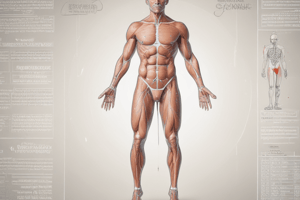Podcast
Questions and Answers
What is the estimated Fat Mass (FM) if the Total Body Weight is 150 lbs and the % Body Fat is 20%?
What is the estimated Fat Mass (FM) if the Total Body Weight is 150 lbs and the % Body Fat is 20%?
- 25 lbs
- 30 lbs (correct)
- 22 lbs
- 28 lbs
Which of the following tissues is NOT included in the Essential Fat category?
Which of the following tissues is NOT included in the Essential Fat category?
- Nerves
- Heart
- Muscles
- Connective tissue (correct)
What percentage of Body Fat is recommended for a female aged 30 with an 'Over fat' classification?
What percentage of Body Fat is recommended for a female aged 30 with an 'Over fat' classification?
- 19-22%
- 24-30% (correct)
- 23-28%
- 16-18%
Which category does a male with 10% body fat fall into?
Which category does a male with 10% body fat fall into?
What is the estimated Fat-Free Mass (FFM) if the Total Body Weight is 180 lbs and the Fat Mass (FM) is 30 lbs?
What is the estimated Fat-Free Mass (FFM) if the Total Body Weight is 180 lbs and the Fat Mass (FM) is 30 lbs?
Which age group has the highest recommended % Body Fat for females in the 'Ave' category?
Which age group has the highest recommended % Body Fat for females in the 'Ave' category?
What does Lean Body Mass (LBM) contain a small percentage of?
What does Lean Body Mass (LBM) contain a small percentage of?
What is the density of fat in adipose tissue?
What is the density of fat in adipose tissue?
What is the classic two-component model based on?
What is the classic two-component model based on?
Which method is based on Archimedes’ principle of water displacement?
Which method is based on Archimedes’ principle of water displacement?
What percentage of adipose tissue is water?
What percentage of adipose tissue is water?
What is the most important factor determining the amount of storage fat?
What is the most important factor determining the amount of storage fat?
Which method is NOT used for body composition assessment?
Which method is NOT used for body composition assessment?
What is the density of fat-free body (FFB)?
What is the density of fat-free body (FFB)?
What is residual lung volume (RV)?
What is residual lung volume (RV)?
What are the sources of error in hydrostatic weighing?
What are the sources of error in hydrostatic weighing?
What does the calculation of body fat percentage from hydrostatic weighing involve?
What does the calculation of body fat percentage from hydrostatic weighing involve?
What are the disadvantages of underwater weighing?
What are the disadvantages of underwater weighing?
How is underwater weight measured in hydrostatic weighing?
How is underwater weight measured in hydrostatic weighing?
At what temperature does water density typically range for hydrostatic weighing?
At what temperature does water density typically range for hydrostatic weighing?
What does the modification of hydrostatic weighing procedures include?
What does the modification of hydrostatic weighing procedures include?
Which method uses air displacement to measure body volume and density?
Which method uses air displacement to measure body volume and density?
What factors can affect accurate results in Bod Pod testing?
What factors can affect accurate results in Bod Pod testing?
What does DEXA assess at whole-body and regional levels?
What does DEXA assess at whole-body and regional levels?
What does DEXA use to quantify bone mineral content, total fat mass, and fat-free mass?
What does DEXA use to quantify bone mineral content, total fat mass, and fat-free mass?
What is crucial for precise results in a DEXA scan?
What is crucial for precise results in a DEXA scan?
What can affect the accuracy of DEXA technologies?
What can affect the accuracy of DEXA technologies?
What are the advantages of Bod Pod?
What are the advantages of Bod Pod?
What are the advantages of DEXA?
What are the advantages of DEXA?
What is a common disadvantage of both Bod Pod and DEXA?
What is a common disadvantage of both Bod Pod and DEXA?
Flashcards
Fat Mass Calculation
Fat Mass Calculation
Fat Mass is 30 lbs.
Non-Essential Tissue
Non-Essential Tissue
Connective tissue is NOT essential fat.
Over Fat Percentage (Female, 30)
Over Fat Percentage (Female, 30)
24-30% body fat is classified as 'Over fat.'
10% Body Fat (Male)
10% Body Fat (Male)
Signup and view all the flashcards
Fat-Free Mass Calculation
Fat-Free Mass Calculation
Signup and view all the flashcards
Highest Recommended % Body Fat (Female, 'Ave')
Highest Recommended % Body Fat (Female, 'Ave')
Signup and view all the flashcards
Lean Body Mass Content
Lean Body Mass Content
Signup and view all the flashcards
Density of Fat
Density of Fat
Signup and view all the flashcards
Two-Component Model
Two-Component Model
Signup and view all the flashcards
Water Displacement Method
Water Displacement Method
Signup and view all the flashcards
Water in Adipose Tissue
Water in Adipose Tissue
Signup and view all the flashcards
Determining Storage Fat
Determining Storage Fat
Signup and view all the flashcards
Method NOT for Body Composition
Method NOT for Body Composition
Signup and view all the flashcards
Density of Fat-Free Body
Density of Fat-Free Body
Signup and view all the flashcards
Residual Lung Volume (RV)
Residual Lung Volume (RV)
Signup and view all the flashcards
Hydrostatic Weighing Error Sources
Hydrostatic Weighing Error Sources
Signup and view all the flashcards
Hydrostatic Weighing Calculations
Hydrostatic Weighing Calculations
Signup and view all the flashcards
Disadvantages of Underwater Weighing
Disadvantages of Underwater Weighing
Signup and view all the flashcards
Underwater Weight Measurement
Underwater Weight Measurement
Signup and view all the flashcards
Hydrostatic Weighing Water Temperature
Hydrostatic Weighing Water Temperature
Signup and view all the flashcards
Hydrostatic Weighing Modifications
Hydrostatic Weighing Modifications
Signup and view all the flashcards
Air Displacement Method
Air Displacement Method
Signup and view all the flashcards
Bod Pod Accuracy Factors
Bod Pod Accuracy Factors
Signup and view all the flashcards
DEXA Assessment
DEXA Assessment
Signup and view all the flashcards
DEXA Measurement Tool
DEXA Measurement Tool
Signup and view all the flashcards
DEXA Results
DEXA Results
Signup and view all the flashcards
DEXA Accuracy Affectors
DEXA Accuracy Affectors
Signup and view all the flashcards
Bod Pod Advantages
Bod Pod Advantages
Signup and view all the flashcards
DEXA Advantages
DEXA Advantages
Signup and view all the flashcards
Bod Pod & DEXA Disadvantage
Bod Pod & DEXA Disadvantage
Signup and view all the flashcards
Study Notes
Body Composition Analysis Methods
- Body composition analysis calculates body fat percentage, fat-free mass, and target body weight.
- Bod Pod, using air displacement, measures body volume and density based on Boyle's Law.
- Factors affecting accurate Bod Pod results include body hair, clothing, and breathing patterns.
- Errors in Bod Pod testing can occur due to deviations in normal breathing and calibration.
- Advantages of Bod Pod include quick administration and minimal client compliance, but it is expensive.
- Dual-Energy X-Ray Absorptiometry (DEXA) assesses bone mass, fat, and lean soft tissue at whole-body and regional levels.
- DEXA uses low-energy x-ray beams to quantify bone mineral content, total fat mass, and fat-free mass.
- Advantages of DEXA include safety, rapid administration, minimal client cooperation, and accounting for individual variability in bone mineral content.
- Fasting prior to a DEXA scan increases accuracy, and calibration of the scanner is crucial for precise results.
- Variability among DEXA technologies, including imaging geometry, X-ray detectors, and software versions, affects accuracy.
- DEXA is expensive and generally accessible only in clinical or research settings.
- Both Bod Pod and DEXA have advantages and disadvantages in accurately assessing body composition.
Studying That Suits You
Use AI to generate personalized quizzes and flashcards to suit your learning preferences.




